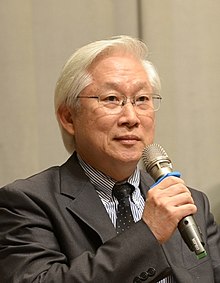Wu Tsung-tsong
Wu Tsung-tsong | |
|---|---|
吳政忠 | |
 Wu in 2017 | |
| Minister of Science and Technology of the Republic of China | |
| Assumed office 20 May 2020 | |
| Preceded by | Chen Liang-gee |
| Minister without Portfolio | |
| In office 20 May 2016 – 19 May 2020 | |
| Deputy Minister of the National Science Council | |
| In office 2006–2008 | |
| Minister | Chen Chien-jen |
| Personal details | |
| Born | 1955 (age 65–66) |
| Nationality | Republic of China |
| Alma mater | National Taiwan University (BS) Cornell University (MS, PhD) |
Wu Tsung-tsong (Chinese: 吳政忠; pinyin: Wú Zhèngzhōng; born 1955) is a Taiwanese politician.
Education and academic career[]
Wu obtained his bachelor's degree in civil engineering from National Taiwan University in 1977, and master's and doctoral degrees in theoretical and applied mechanics from Cornell University in the United States.[1] He was a professor within the Institute of Applied Mechanics at National Taiwan University.[2][3]
Political career[]
Wu served as deputy minister of the National Science Council under Chen Chien-jen.[4] He returned to public service as minister without portfolio specializing in technology-related policy upon the presidential inauguration of Tsai Ing-wen in 2016.[5] From this position, Wu commented on several aspects of digital infrastructure,[6] including implementation of 5G telecommunications[7][8] and the proliferation of fake news online.[9] He served concurrently on the governmental Board of Science and Technology as a deputy convenor.[10] Wu was retained in his post when William Lai assumed the premiership in September 2017.[11] He remained as Su Tseng-chang replaced Lai in January 2019.[12][13] Wu succeeded Chen Liang-gee as minister of science and technology at the start of Tsai Ing-wen's second presidential term.[14][15]
References[]
- ^ "Tsung Tsong Wu". National Taiwan University. Retrieved 19 May 2020.
- ^ Chao, Vincent Y. (23 April 2010). "DPP forum discusses environment". Taipei Times. Retrieved 19 May 2020.
- ^ Pan, Han-shen (27 June 2012). "Cracks in nuclear policy beg questions". Taipei Times. Retrieved 19 May 2020.
- ^ Shih, Hsiu-chuan (10 April 2008). "Reports point to economic achievements under DPP". Taipei Times. Retrieved 19 May 2020.
- ^ Lin, Chia-nan (21 May 2020). "New chief heads science ministry". Taipei Times. Retrieved 20 May 2020.
- ^ Chen, Wei-han (25 November 2016). "Executive Yuan approves digital infrastructure plan". Taipei Times. Retrieved 19 May 2020.
- ^ Hetherington, William (22 March 2017). "Cabinet unveils US$1.5bn digital infrastructure plan". Taipei Times. Retrieved 19 May 2020.
- ^ Shan, Shelley (5 December 2019). "NCC sets NT$30bn 5G spectrum auction floor price". Taipei Times. Retrieved 19 May 2020.
- ^ Lee, Hsin-fang; Chung, Jake (23 July 2017). "Rumor-quashing Web site planned". Taipei Times. Retrieved 19 May 2020.
- ^ Lin, Chia-nan (4 December 2018). "KMT lawmakers demand answers from minister". Taipei Times. Retrieved 19 May 2020.
- ^ Chen, Wei-han (8 September 2017). "Lai to replace two Cabinet ministers, retain all others". Taipei Times. Retrieved 19 May 2020.
- ^ Yeh, Su-ping; Ku, Chuan; Hsu, Elizabeth; Huang, Frances; Yen, William (13 January 2019). "Kolas Yotaka to stay on as Cabinet spokeswoman". Central News Agency. Retrieved 19 May 2020.
- ^ Ku, Chuan; Yen, William; Hsu, Elizabeth; Huang, Frances (12 January 2020). "Acting COA minister to be officially named to head agency: sources". Central News Agency. Retrieved 19 May 2020.
- ^ "Cabinet to contain familiar faces, sources say". Taipei Times. 16 May 2020. Retrieved 19 May 2020.
- ^ Ku, Chuan; Yu, Matt; Yeh, Joseph (19 May 2020). "Minor Cabinet reshuffle announced ahead of Tsai's new term". Central News Agency. Retrieved 19 May 2020.
| Wikimedia Commons has media related to Wu Tsung-tsong. |
- Ministers of Science and Technology of the Republic of China
- Living people
- Cornell University alumni
- 1955 births
- National Taiwan University faculty
- National Taiwan University alumni
- Taiwanese expatriates in the United States
- Taiwanese politician stubs
